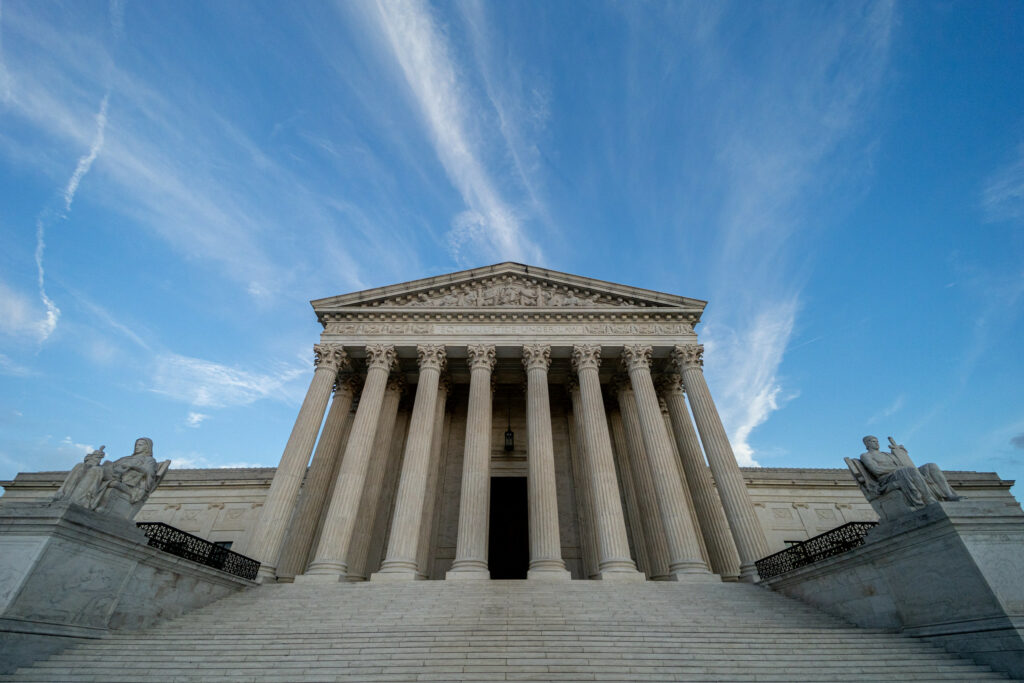SCOTUS Leaves Trump on Colorado Ballot
An unsurprising result.

Via WaPo: Supreme Court keeps Trump on ballot, rejects Colorado voter challenge.
The justices said the Constitution does not permit a single state to disqualify a presidential candidate from national office, declaring that such responsibility “rests with Congress and not the states.”
There is a lot to be said, but I only have time for a quick observation (and it has been on my mind since oral arguments): the argument that the president is a national office and therefore a given state shouldn’t be allowed to make determinations about candidacies for a national office utterly ignores the fact that our elections are all administered by the states.
I was frustrated by this line of questioning during oral arguments (a started post on this subject remains in the draft folder) and I am frustrated by it now. I am frustrated because it seems to be vested in a fiction (that the election of the president, and mostly especially the nomination process) is national when it is clearly a state-by-state process.
Understand that my personal and professional preference would be that the election of the president be, in fact, a national process. But. It. Isn’t.
Again, this is especially true of the use of primaries for nominations, which isn’t even a constitutionally prescribed process.
Hence, my usage of “fiction” above because it pretends like there is a national remedy for this that is analogous to state-by-state level processes. I mean, yes, Congress could pass a law, but there is no other mechanism. I supposed if they argued simply that section 3 of the Fourteenth Amendment was not self-executing, and therefore required legislation, I could live with that. But to predicate even part of the reasoning on the idea that states aren’t where elections are fundamentally run is to ignore reality and is punting on any substantive decision about the real matter at hand, which is whether or not Trump did, in fact, foment insurrection.
And yes, I do understand that SCOTUS is making a distinction between federal offices and state offices. The problem is that the states conduct elections for federal officeholders, which makes the distinction that the Court is trying to make more complicated than it sounds.
This is all made all the more frustrating because regardless of the fact that the presidency is a federal office, the determination of who gets sworn in January 2025 will very much come down to state-level elections.
Look, while I am quite sympathetic to Colorado’s position, I understand the potential chaos that upholding it could unleash. But the fault is not Colorado’s. It’s Trump’s for behaving as he did post-2020 election.
I think the main thing that I find frustrating about this (apart from what I truly see as an utter disconnect about how elections are administered in the US) is that this is not a ruling that addresses the real problems we are facing in regard to the very real possibility that a fellow who said he understood and loved the rioters at the Capitol may well be the next president of the United States.
UPDATE (James Joyner): I concur with my colleague’s assessment that, in practice, there are no “Federal” elections, only elections for Federal offices administered by the several states. That said, there’s considerable judicial and legislative precedent for the notion that Congress has the ultimate say over elections for Federal offices.
I only had time to scan the main opinion, which I’ve highlighted in the attachment. I don’t find it particularly objectionable but am a bit surprised that they used the existence of Section 5 as the main rationale for arriving at their conclusion.





For clarity of details, Trump’s name was already on the Colorado primary ballots. The practical question was whether votes for Trump would be counted. That probably had something to do with the last-minute rush scheduling to get this opinion out today. At some point after 7:00 pm tomorrow, the Colorado Secretary of State was going to be in the position of deciding on her own what to announce for results.
I share your frustration and feel your pain. Alas, this is not a problem that can be solved by the Supreme Court. Congress had the chance to solve it (twice, I might add) but punted. We teh peepul (specifically, we the Republicans) had the chance to nip this in the bud back in 2016 and punted for the lulz. AND Republicans have the chance to solve the problem even now but are just as resolved to elect a clown to the Presidency as they were in 2016 and 2020.
To drone on with a theme I keep coming back to, the government is only as good as the people who are elected and the people who elect them. I don’t know where this circus goes from here, but it IS a good time to be old (and relatively financially stable). It seems as though two incompatible systems are competing to occupy the same geographic space–much like the case at the time of the War Between the States–but more dramatic this time because the geographic lines are much more blurred. Color me not optimistic.
So, to summarize, the states are competent to decide whether abortion is allowed within their borders, but not competent to decide who is eligible for the ballot in elections run by, and within, each state.
Yes, administered by the states. That doesn’t mean states have carte blanche when it comes to federal elections. Qualifications for President are federal, not state, qualifications. Administering elections does not include (and should not include) each state having the individual authority to assess and adjudicate those federal qualifications independently.
Did you read what they wrote?
It’s not about process. It’s about who decides who is and isn’t qualified to be President according the the Constitution. And the SCOTUS is saying individual states do not have the independent authority to decide to disqualify a candidate for the Presidency on the basis of section 3 of the 14th Amendment. The fact that states administer elections, or that we are at this weird place where ostensibly internal party matters like primary elections have morphed to be state-sponsored enterprises, is irrelevant to the question they answered.
I go back to the attempt to get McCain disqualified because he was born in Panama. Who is qualified to determine who is and isn’t a “natural born citizen” for qualification for federal office? If we can leave the interpretation of Section 3 of the 14th Amendment to independent adjudication by the states, why not that as well?
The difference, of course, is that Congress passed a law defining “natural born citizen” and there is no similar law for Section 3. The attempts against McCain went nowhere because of that law.
@Tony W: Sigh. This was a 9-0 decision. That means the two Obama Justices (Kagan and Sotomayor) and the Biden Justice (Jackson) went along. They’re tasked here with interpreting a 150-plus-year-old section that has previously only been adjudicated on the particular set of facts that gave rise to it. The rationale that Section 5 gives Congress sole power to enforce it is hardly nutty.
@Tony W:
Boo-hoo. Read the Constitution.
It was 9-0, dude.
@James Joyner: To give a modern Congress (McCarthy/Johnson, McConnell/??, Hastert rule, filibuster, unable to pass a budget, subject to judicial review by this same Court) sole power to do anything is saying nothing can be done.
@James Joyner: It’s a 9-0ish (there are concurrences with competing rationales) decision because the court’s Federalist Society hacks rightly joined the court’s liberals embracing politicized judicial activism, a supposed no-no.
The court’s conservatives hate judicial activism until it suits their partisan goals. In this case, a noble goal: preventing the chaos and potential violence looming behind ballot disqualifications of Trump.
Problem is there’s nothing in the text or original intent of the insurrection clause that demands a federal law be passed first. So good for judicial activism, to block the (short-term) horrors that would result from what a textualist/originalist reading demands: the swift disqualification of Trump, an insurrectionist and traitor.
It just would be nice if conservatives would cut the holier-than-thou scolding of liberal judges, when it’s obvious Republicans also believe in a living constitution that should be bent to will of living American citizens and massaged to meet current social demands.
Conservatives’ constitution is a dead letter, always intended to drag the country backwards at the right’s behest. They’re not dispassionately and objectively calling balls and strikes. Not only shown by this activist ruling, but by its swiftness compared to deliberately slow-walking the immunity cases — an attempt to reduce the legal world’s entanglement in the 2024 election. (Also fine. Let Americans get what our voting habits earn us.)
@gVOR10:
Whataboutism.
@gVOR10:
True. Alas, that’s both a bug and a feature of the existing system and we can’t fix it except by electing representatives to Congress committed to addressing the systemic problems and solving them. Good luck with that, BTW; I’m rooting for you.
@Paul L.:
I’m criticizing SCOUTUS by pointing out an obvious flaw in SCOTUS’ argument. How is that whataboutism?
@gVOR10:
Someone levelled that accusation at Paul a few years back. He didn’t understand it, but pops up once a week to level it at someone else, always hoping that this time he’ll have used it correctly.
When in Rome and all that…
What about other qualifications a state may have for placing a candidate on a ballot? Like filing paperwork on time, or requiring signatures (often for some parties but not others). Does that not cause a patchwork of different candidates in different state? Or do such qualifications not apply to the duopoly?
It’s a dumb ruling. If the presidential candidate was 33 years old, would we be just as obtuse about states not bring able to parse the constitution?
@gVOR10: Alas, the 14th Amendment was written a long time ago, when different circumstance obtained. But our fundamental law doesn’t change just because our politics are different.
@Console:
Or if the candidate failed to follow the appropriate filing rules of that state.
This is kind of my point: there are definitely ways in which a given state’s laws could keep a given candidate off the ballot.
Indeed, it is not uncommon for a given third-party candidate not to qualify in all fifty states.
@Console: if Cenk Uygar wanted to be useful, he would try to get on a ballot and sue because the state cannot remove him.
(He does not want to be useful, but what can you expect from someone who names their podcast after the perpetrators of the Armenian genocide?)
@James Joyner:
The 14th A is fundamental law and used to say insurrectionists don’t get to be prez. But now, thanks to politics changing the court, it just changed to “but there’s nothing you can do to stop him.”
@gVOR10:
Charges of “Whataboutism”: A Pet Peeve of Mine
What an interesting concurrence from Justice Barrett. Although the opinion of the Court was unanimous on the issue of whether any single State could unilaterally remove a presidential candidate from the ballot absent a prior Congressional action, the three liberal justices objected that the majority went too far in setting methodology to be followed. Barrett concurrence was basically “I agree with you ladies, but why do you have to be so bitchy? Can’t we just get along?”
I get the feeling the Justices really don’t like each other.
SCOTUS once again rules that sometimes the words in the constitution don’t mean anything at all to them. Emoluments, well regulated militia, insurrection. It’s all just a bunch of nonsense to the Supremes, it might as well not even be there.
@DMA:
Right of the people means giving the Government the authority to do something. Like peacefully assemble.
@DMA:
You are Political Science degree 14th amendment expert?
Section 5 Enforcement
“Congress shall have the power” limits the 14th
Just like “well regulated militia” and muskets limits the 2nd.
@gVOR10:
@DMA:
The main opinion rests on this:
It’s hardly unreasonable to rule that this means that Congress, not state courts and state election officials, is in charge of determining who is an insurrectionist and thus disqualified from serving.
@James Joyner: The issue, at least for the originalists, should have been that this is obviously not the original intent. There was no ruling by congress at the time the amendment passed making confederates ineligible for the ballot. In fact, Johnson had pardoned most of them. The amendment actually requires an act of congress to get back on the ballot.
@James Joyner:
It makes sense that congress should be able to overrule states when they present candidates that are constitutionally ineligible. But it also makes sense that states should determine eligibility prior to that point because they have to run the elections. For a group of people that stomped all over that section to gut the voting rights act to get all “congress should pass a law” is very eyeroll inducing.